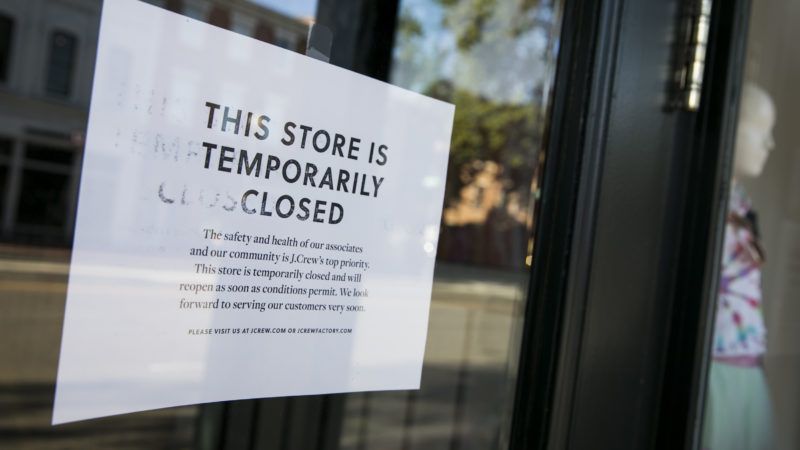Texas Admitted It Can't Enforce Its COVID-19 Lockdown. More States Should Do The Same.
The sooner everyone else recognizes those limits, the sooner we can shift to policies that balance public health and economic freedom.

The extent and severity of the COVID-19 economic shutdowns vary from place to place, but the one thing almost all of them have in common is that they're not really enforceable.
We may have reached the point where most people are realizing that.
Case in point: The Texas Department of Licensing and Regulation has decided to drop 200 enforcement investigations into barbers and cosmetologists who returned to work in recent weeks, The Dallas Morning News reports. The department is also dropping 180 cases that had not moved past the complaint stage—so stop tattling on your neighborhood salons, Texans—which seems like a clear admission that enforcing the shutdown is simply untenable.
The turning point, in Texas at least, probably came a few weeks ago when a Dallas salon owner, Shelley Luther, was sentenced to seven days in jail for reopening her business on April 24. The outrage over Luther's arrest and sentencing eventually convinced Gov. Greg Abbott, a Republican, to remove jail time as a punishment for people who violated the state's stay-at-home order.
The licensing department has now gone a step farther, saying it will allow "the reopening of cosmetology and barbering establishments retroactively to April 2," wiping out any violations from the past six weeks.
In Wisconsin, where the state Supreme Court last week struck down a statewide stay-at-home order, counties are lifting their own lockdown orders due to "mounting confusion" over their legality. But the bigger question, again, might be their enforcability. I've seen a lot of coverage of Wisconsinites heading to bars in the wake of the Supreme Court ruling; I haven't seen much evidence that people are getting arrested for violating local shutdown orders.
And in Washington, more than 25,000 complaints about alleged lockdown violations were filed across the state, but as of May 8 the state had revoked exactly one business license.
As the days go on, expect to see more anecdotal evidence like this:
Update:Just now a local Bellmawr Police Lieutenant walked up to front door& owner of Atilis Gym&said "You're all in violation of Governor's executive order. That being said stay safe&have a nice day." And walked away&crowd of supporters let out a loud cheer @FOX29philly pic.twitter.com/M3XvbHfvV0
— Steve Keeley (@KeeleyFox29) May 18, 2020
The government's role in all of this has always been more limited than either the bureaucrats drafting stay-at-home orders imagine or the protesters shouting about tyranny fear. Since forcibly quarantining 330 million people was never really possible, the lockdowns that have wrecked the economy and slowed the spread of COVID-19 over the past two months were ultimately based on voluntary compliance.
Don't get me wrong: There's been plenty of heavy-handed enforcement—in New York, in California, in Wisconsin, and in plenty of other places. But it's been ineffectual and perhaps even counterproductive, given that cops who get close enough to issue a citation or make an arrest are hardly practicing social distancing. (Imagine what a public health disaster it might be if they were somehow capable of detaining or fining everyone who broke quarantine.) It certainly isn't the reason people have been practicing social distancing. Research from FiveThirtyEight has shown pretty conclusively that most state-level stay-at-home orders came days or even weeks after most Americans were already staying home.
That remains true in places where governments are fighting to maintain lockdowns as compliance frays—like in Pennsylvania, where Gov. Tom Wolf has threatened businesses with the loss of their licenses if they go along with county-level reopening plans that move faster than his state-issued directives. And it remains true in places where lockdowns have already been lifted: In Georgia, restaurant reservations are still 90 percent lower than they were at this same time last year, according to data from OpenTable, even though Gov. Brian Kemp has lifted the lockdown.
The biggest benefit that comes from lifting stay-at-home orders is an end to the charade that such lockdowns can be enforced. Kemp didn't "reopen" Georgia. All he did was give people consumers and businesses permission to choose their own acceptable levels of risk—something they're doing anyway in every state.
Governments at all levels should continue to provide accurate information about what's relatively safe (like going to the beach or drinking outside) and what isn't (like getting together in big groups or using public transportation). But enforcement should be reserved for where it can actually work. An official order closing stadiums and the like seems reasonable. Jailing salon owners does not.


Show Comments (80)